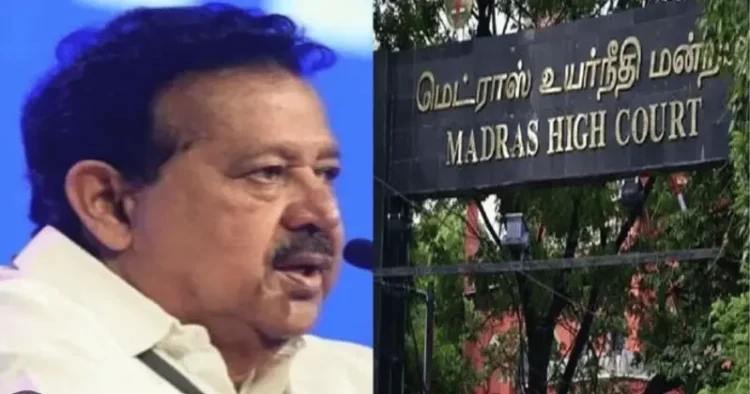The Madras High Court on Thursday, December 21, 2023, sentenced Tamil Nadu Education Minister K Ponmudi to 3 years of simple imprisonment in a Disproportionate Assets (DA) case.Justice G Jayachandran of Madras High Court sentenced the Education Minister and also imposed a fine of Rs 50 lakh each on Ponmudi and his wife.
However, the judge suspended the sentence for 30 days for Ponmudi, as he currently holds the Higher Education Minister portfolio. The High Court, allowing an appeal by the Directorate of Vigilance and Anti-Corruption (DVAC), overturned the trial court’s acquittal order from June 28, 2023.
The conviction pertains to the period of 2006–11, when Ponmudi held the position of Minister for High Education, Mines, and Minerals in the previous DMK government. The DVAC initiated the case in 2002 during the AIADMK regime, with the trial court initially acquitting the minister in 2023. The Anti-Corruption Bureau conducted a thorough investigation, involving the examination of 39 witnesses, including a tehsildar and bank officials.
The case, initially heard in Villupuram Chief Criminal Court, was later transferred to Villupuram Anti-Corruption Special Court in 2015. Subsequently, in 2022, it was moved to Vellore District Principal Sessions Court.
Justice Jayachandran, while confirming Ponmudi’s conviction, criticised the trial court for reducing the construction value and excluding Rs. 2,88,000 incurred towards repair of a building rented by Ponmudi during the check period. The judge emphasised that the trial court erred in excluding the repair expenditure, despite Ponmudi disclosing it in his income tax returns.
The High Court sentenced Ponmudi to three years of simple imprisonment and imposed a fine of Rs 50 lakhs on both the Minister and his wife. However, the court suspended the quantum of punishment for 30 days.
Justice Jayachandran, while delivering an 85-page order, criticized the trial court’s acquittal, declaring it “palpably wrong, manifestly erroneous, and demonstrably unsustainable.”
The case, initiated during the AIADMK regime in 2002, saw Ponmudi acquitted by the trial court in June 2023. However, the DVAC appealed against the acquittal, leading to this reversal of fortune for Ponmudi. Justice Jayachandran highlighted the tailored nature of the Income Tax returns filed by Ponmudi and his wife, emphasizing their delayed response to the Final Opportunity Notice (FoN).
The judge clarified the scope and limits of the Appellate Court under Section 378 of the Criminal Procedure Code (Cr.P.C) when dealing with appeals against acquittal. He asserted that the Appellate Court can and should intervene if the judgment of acquittal is absurd, perverse, or erroneous, disregarding material evidence.
This legal setback poses a challenge for the DMK, already grappling with the disqualification of Senthi Balaji. Annamalai, a prominent figure in Tamil Nadu politics, remarked on the DMK’s downfall, accusing the party of functioning with corruption as its primary objective. The BJP, seizing the opportunity, plans to use corruption charges against the DMK to shape a narrative that associates the party with corruption, mirroring the strategy employed during the recent assembly polls.
Traditionally, Tamil Nadu voters have given little importance to corruption charges, impacting both the DMK and AIADMK minimally. However, changing times, increased social media influence, and Annamalai’s anti-corruption campaign against the DMK have shifted public perception. The BJP aims to reinforce the narrative that the INDIA bloc is comprised of corrupt parties, utilising cases like Ponmudi’s conviction to their advantage.
Ponmudi’s sentencing marks a significant departure for the DMK, as he becomes the first leader in the party to be convicted. The party’s standard response to corruption charges, asserting that none of its leaders have ever been convicted, is now rendered outdated. The development could impact the party’s standing, especially as it prepares for the 2024 Lok Sabha polls.
The verdict has sparked discussions about corruption and accountability in political circles, with the DVAC’s successful appeal highlighting the importance of stringent anti-corruption measures. As Ponmudi’s legal team contemplates further steps, the case adds a new chapter to the ongoing discourse surrounding political accountability and the legal consequences of corruption allegations against public officials.




















Comments